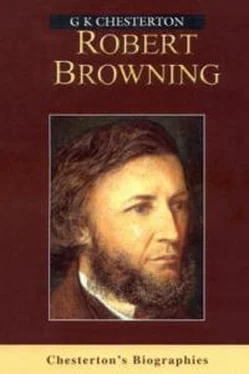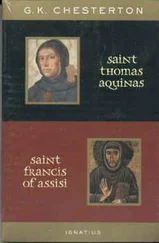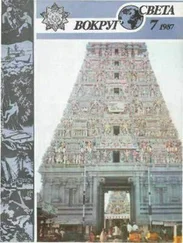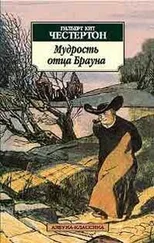Гилберт Честертон - Robert Browning
Здесь есть возможность читать онлайн «Гилберт Честертон - Robert Browning» весь текст электронной книги совершенно бесплатно (целиком полную версию без сокращений). В некоторых случаях можно слушать аудио, скачать через торрент в формате fb2 и присутствует краткое содержание. Год выпуска: 2014, Издательство: epubBooks Classics, Жанр: Биографии и Мемуары, на английском языке. Описание произведения, (предисловие) а так же отзывы посетителей доступны на портале библиотеки ЛибКат.
- Название:Robert Browning
- Автор:
- Издательство:epubBooks Classics
- Жанр:
- Год:2014
- ISBN:нет данных
- Рейтинг книги:5 / 5. Голосов: 1
-
Избранное:Добавить в избранное
- Отзывы:
-
Ваша оценка:
- 100
- 1
- 2
- 3
- 4
- 5
Robert Browning: краткое содержание, описание и аннотация
Предлагаем к чтению аннотацию, описание, краткое содержание или предисловие (зависит от того, что написал сам автор книги «Robert Browning»). Если вы не нашли необходимую информацию о книге — напишите в комментариях, мы постараемся отыскать её.
Robert Browning — читать онлайн бесплатно полную книгу (весь текст) целиком
Ниже представлен текст книги, разбитый по страницам. Система сохранения места последней прочитанной страницы, позволяет с удобством читать онлайн бесплатно книгу «Robert Browning», без необходимости каждый раз заново искать на чём Вы остановились. Поставьте закладку, и сможете в любой момент перейти на страницу, на которой закончили чтение.
Интервал:
Закладка:
A man might read those two poems a great many times without happening to realise that they are two poems on exactly the same subject—the subject of a trusting woman deserted by a man. And the whole difference—the difference struck by the very first note of the voice of any one who reads them—is this fundamental difference, that Goldsmith's words are spoken about a certain situation, and Burns's words are spoken in that situation.
In the transition from one of these lyrics to the other, we have a vital change in the conception of the functions of the poet; a change of which Burns was in many ways the beginning, of which Browning, in a manner that we shall see presently, was the culmination.
Goldsmith writes fully and accurately in the tradition of the old historic idea of what a poet was. The poet, the vates , was the supreme and absolute critic of human existence, the chorus in the human drama; he was, to employ two words, which when analysed are the same word, either a spectator or a seer. He took a situation, such as the situation of a woman deserted by a man before–mentioned, and he gave, as Goldsmith gives, his own personal and definite decision upon it, entirely based upon general principles, and entirely from the outside. Then, as in the case of The Golden Treasury , he has no sooner given judgment than there comes a bitter and confounding cry out of the very heart of the situation itself, which tells us things which would have been quite left out of account by the poet of the general rule. No one, for example, but a person who knew something of the inside of agony would have introduced that touch of the rage of the mourner against the chattering frivolity of nature, "Thou'll break my heart, thou bonny bird." We find and could find no such touch in Goldsmith. We have to arrive at the conclusion therefore, that the vates or poet in his absolute capacity is defied and overthrown by this new method of what may be called the songs of experience.
Now Browning, as he appears in The Ring and the Book , represents the attempt to discover, not the truth in the sense that Goldsmith states it, but the larger truth which is made up of all the emotional experiences, such as that rendered by Burns. Browning, like Goldsmith, seeks ultimately to be just and impartial, but he does it by endeavouring to feel acutely every kind of partiality. Goldsmith stands apart from all the passions of the case, and Browning includes them all. If Browning were endeavouring to do strict justice in a case like that of the deserted lady by the banks of Doon, he would not touch or modify in the smallest particular the song as Burns sang it, but he would write other songs, perhaps equally pathetic. A lyric or a soliloquy would convince us suddenly by the mere pulse of its language, that there was some pathos in the other actors in the drama; some pathos, for example, in a weak man, conscious that in a passionate ignorance of life he had thrown away his power of love, lacking the moral courage to throw his prospects after it. We should be reminded again that there was some pathos in the position, let us say, of the seducer's mother, who had built all her hopes upon developments which a mésalliance would overthrow, or in the position of some rival lover, stricken to the ground with the tragedy in which he had not even the miserable comfort of a locus standi . All these characters in the story, Browning would realise from their own emotional point of view before he gave judgment. The poet in his ancient office held a kind of terrestrial day of judgment, and gave men halters and haloes; Browning gives men neither halter nor halo, he gives them voices. This is indeed the most bountiful of all the functions of the poet, that he gives men words, for which men from the beginning of the world have starved more than for bread.
Here then we have the second great respect in which The Ring and the Book is the great epic of the age. It is the great epic of the age, because it is the expression of the belief, it might almost be said, of the discovery, that no man ever lived upon this earth without possessing a point of view. No one ever lived who had not a little more to say for himself than any formal system of justice was likely to say for him. It is scarcely necessary to point out how entirely the application of this principle would revolutionise the old heroic epic, in which the poet decided absolutely the moral relations and moral value of the characters. Suppose, for example, that Homer had written the Odyssey on the principle of The Ring and the Book , how disturbing, how weird an experience it would be to read the story from the point of view of Antinous! Without contradicting a single material fact, without telling a single deliberate lie, the narrative would so change the whole world around us, that we should scarcely know we were dealing with the same place and people. The calm face of Penelope would, it may be, begin to grow meaner before our eyes, like a face changing in a dream. She would begin to appear as a fickle and selfish woman, passing falsely as a widow, and playing a double game between the attentions of foolish but honourable young men, and the fitful appearances of a wandering and good–for–nothing sailor–husband; a man prepared to act that most well–worn of melodramatic rôles, the conjugal bully and blackmailer, the man who uses marital rights as an instrument for the worse kind of wrongs. Or, again, if we had the story of the fall of King Arthur told from the stand–point of Mordred, it would only be a matter of a word or two; in a turn, in the twinkling of an eye, we should find ourselves sympathising with the efforts of an earnest young man to frustrate the profligacies of high–placed paladins like Lancelot and Tristram, and ultimately discovering, with deep regret but unshaken moral courage, that there was no way to frustrate them, except by overthrowing the cold and priggish and incapable egotist who ruled the country, and the whole artificial and bombastic schemes which bred these moral evils. It might be that in spite of this new view of the case, it would ultimately appear that Ulysses was really right and Arthur was really right, just as Browning makes it ultimately appear that Pompilia was really right. But any one can see the enormous difference in scope and difficulty between the old epic which told the whole story from one man's point of view, and the new epic which cannot come to its conclusion, until it has digested and assimilated views as paradoxical and disturbing as our imaginary defence of Antinous and apologia of Mordred.
One of the most important steps ever taken in the history of the world is this step, with all its various aspects, literary, political, and social, which is represented by The Ring and the Book . It is the step of deciding, in the face of many serious dangers and disadvantages, to let everybody talk. The poet of the old epic is the poet who had learnt to speak; Browning in the new epic is the poet who has learnt to listen. This listening to truth and error, to heretics, to fools, to intellectual bullies, to desperate partisans, to mere chatterers, to systematic poisoners of the mind, is the hardest lesson that humanity has ever been set to learn. The Ring and the Book is the embodiment of this terrible magnanimity and patience. It is the epic of free speech.
Free speech is an idea which has at present all the unpopularity of a truism; so that we tend to forget that it was not so very long ago that it had the more practical unpopularity which attaches to a new truth. Ingratitude is surely the chief of the intellectual sins of man. He takes his political benefits for granted, just as he takes the skies and the seasons for granted. He considers the calm of a city street a thing as inevitable as the calm of a forest clearing, whereas it is only kept in peace by a sustained stretch and effort similar to that which keeps up a battle or a fencing match. Just as we forget where we stand in relation to natural phenomena, so we forget it in relation to social phenomena. We forget that the earth is a star, and we forget that free speech is a paradox.
Читать дальшеИнтервал:
Закладка:
Похожие книги на «Robert Browning»
Представляем Вашему вниманию похожие книги на «Robert Browning» списком для выбора. Мы отобрали схожую по названию и смыслу литературу в надежде предоставить читателям больше вариантов отыскать новые, интересные, ещё непрочитанные произведения.
Обсуждение, отзывы о книге «Robert Browning» и просто собственные мнения читателей. Оставьте ваши комментарии, напишите, что Вы думаете о произведении, его смысле или главных героях. Укажите что конкретно понравилось, а что нет, и почему Вы так считаете.










